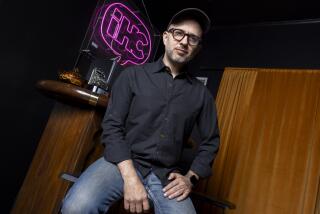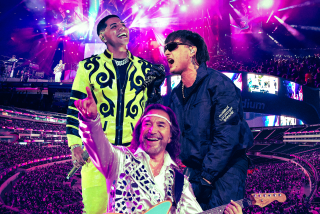Stage Presence
- Share via
If you can make it in New York clubs, you can make it anywhere. But if you can make it in Los Angeles clubs, you can make it everywhere, which explains why the garage bands that aspire to grow up and become rock stars brave the sometimes treacherous local scene. Southern California is the epicenter of the music industry, and that means even tiny clubs here have a searing spotlight as well as the frostiest audiences this side of the Iditarod. Now only will the crowds not dance, they mutter into their cell phones during the high notes and leave during the third song.
Still, if you want to hear what will be on MTV in six months, if you want to see the next fashion in pop and rock, this is the town to find it. Or to be it. From the Eagles and the Doors, through Van Halen and Guns N’ Roses to the Red Hot Chili Peppers and Linkin Park, the clubs here were the early proving ground for scores of superstar acts. The talent levels on any local stage can vary wildly night to night--sometimes even hour to hour--and the next performer could be the new Van Morrison or, well, the latest Vanilla Ice. Watch what the performers wear, too; be it homemade, secondhand or fresh from the catwalk, the would-be stars on the Sunset Strip know that here, of all places, your wardrobe has to be ready for your close-up.
“The Hollywood myth about someone in the audience that’s going to make you famous, you know, the producer with the cigar and all? Well, here in L.A. it’s true.” The man talking is Adam Levine, lead singer of Maroon5, one of the more promising bands in Los Angeles clubs. The group is on the cusp of success, with a slot on a national tour featuring Sheryl Crow, Train and Ziggy Marley, and they are fairly certain they won’t run into crowds as chilled as those at the Whisky, where the group first played in 1995, when its members were students at the Brentwood School.
“L.A. and New York are the most cutthroat places to build a following,” Levine says, wiping stage sweat from his brow. The singer and his bandmates have just finished a rollicking, sold-out performance at the Troubadour, where women in the audience literally cried. But Levine is having a hard time exorcising the ghosts of L.A. gigs gone bad. “What makes it hard is this is where everybody goes to be in a band. If you’re the hometown hero of, whatever, Wyoming, it’s different. I mean, I’m sure that’s difficult there, too, it’s difficult to build a following anywhere. But when you’re here in L.A. and there’s seven bands on every bill and you have these legendary clubs like the Roxy, the Whisky and the Troubador. Well, you better be good. Damn good.”
There are a lot of damn good bands in L.A., but most of them burn out, fade away or simply sell their gear at a pawnshop and surrender all future ovations for a “real” job. In fact, for the members of the three bands profiled in this story, the hardest part for most of them was getting time off from their day jobs for a weekday fashion shoot. Be you a lawyer or pizza delivery guy, you have to serve somebody. “This is the type of shirt I’m going to wear when I can afford it,” one of the young rocker models muses during the fashion shoot.
Fashion shoots, making music videos, prowling the red carpet at awards shows--those things are not a part of everyday life for the talented quintet Damone. Maybe someday, but for now their nights offstage are more likely to find them hanging out in the small house in Burbank that is their unofficial headquarters. It’s Friday night and their attentions are focused on green-bottle beer and banter about the careers of Neil Young, Rage Against the Machine and Brian Wilson (all of whom, coincidentally, found their paths to glory in Southern California). Dave Boyle plays guitar and sometimes frets about the peculiar brand of fan he sees when they play locally. The group has traveled to gigs in San Francisco and as far east as Pittsburgh, but they’ve found the most jaundiced eyes on their home turf.
“Everybody in this town is in a band. Or manages a band. Or does sound for a band,” Boyle says. “And when you get up there to play, unless you’re in just a pure dive, you find a lot of cynical faces in the audience.
“The crowds here are just different. But, you know, to do well here means a lot. The respect of our peers is a badge. And when you’re outside ‘the machine’ that means a lot.”
“The machine” is the major label system of the music industry, and it is a strange, creaky contraption. Despite that machine’s well-publicized disasters of late (among them rampant online piracy, an artists’ rights movement, a stultifying corporate culture from conglomeration and sagging sales), the machine still spits out money and fame for young bands. Or, sometimes, it just spits out the bands themselves. In another wrinkle that sets L.A. apart, many of the local homegrown bands have members who work by day in music industry offices and hit the stage on nights and weekends hoping their show business careers will become more show and less business. In Damone, for instance, two members work at DreamWorks Records and a third, singer Shane Alexander, works in the offices of Irving Azoff, manager of the Eagles and the Backstreet Boys who is known as one of the town’s best businessmen and one of its world-class screamers. Alexander is a struggling musician and a Buddhist--hardly the type of person an industry outsider would peg for a job in Azoff’s realm, but the industry’s Dream Factory is staffed by people just like Alexander. Those jobs give them an excruciatingly close view of the future they long for.
“Our goal is to pay the bills and find someone who appreciates us,” Alexander says. “If you’re a band from somewhere else, anywhere else, there’s some mystery to you for the industry. There’s no mystery about us. They know us and they see us one way, and that’s not always the way we want.”
Still, L.A. is the place to be seen and, as Alexander notes, on any given night the crowd might have the Lottery Ticket walking around among its black-clad ranks. “You do think about it; you wonder, is this the night someone sees us and hears something in our music they believe in?”
While some bands are beholden to a certain musical time and place, others find their sonic directions are subject to change. It’s another part of the churn that is so singular to the L.A. scene. So many bands start or come through here, see their lineup change, find a label deal or agent, and break up or quit here, that sometimes it’s dizzying to keep track of any of it.
The band Pushover, for instance, was once a ska band called Mealticket. Then a membership change in the band tilted its focus, and the remaining players traded in their horns for a more straightforward rock sound. They have spent a decade pursuing their dreams of music as a career. Their day jobs include high school teacher, mortgage company executive, lawyer, private investigator. “We definitely know that we want to do this, music, for a living,” says Ricky Estrada, guitarist and lead singer. “We talk about it all the time. I want to make enough money to support myself and a family and make music. You know, we don’t want to be on ‘Cribs’ with an $11-million dollar house and everything. We don’t need to make billions and be super famous. We just want to live comfortably. We don’t need to be Tupac. I mean, look how that ended up.”
Even if Pushover never makes it over the hump, Estrada and company have already played out part of their jukebox fantasy by walking in the footsteps of great L.A. bands of the past. “When we play the Roxy, the Whisky or the ‘Troub’ or whatever, I just get really jazzed because we’re on the same stage where my heroes played, like Jane’s Addiction and the Doors and Oingo Boingo.”
Pushover and Damone are inching closer to music industry success, but it’s Maroon5 that has jumped into the mainstream with their spot on the Jeep World Outside Festival. Unlike many of their peers, their history has been one of smooth edges and gentle ramps. They had high school friends listening from day one and industry interest not long after. The trajectory hasn’t been too steep; in 1997, the group (then called Kara’s Flowers and with a more alternative-rock sensibility) released an album on Reprise Records and hit the road with the bands Reel Big Fish and Goldfinger. Their sound now, a pop-rock blend guided by the compass points of Prince and Stevie Wonder, sounds radio-ready. Their comfortable ride to date is apparent. Lead singer Levine has the smirk and swagger of a college star on draft day and his bandmates seem to feel a bit guilty that things are going so well.
“We were blessed,” bassist Mickey Madden says. “I’d be hesitant to complain, ever. We’ve been lucky enough to have the support of families and have a dose of professionalism from a very young age. We sort of saw how the monster works. For a lot of bands it’s a real struggle, a real fight. I mean we’ve been down, but our down has been, well, pretty lucky.”
Lucky, yes, but luck sometimes runs out and the gears of the Los Angeles music machine make for a hazardous workplace. In hushed tones, Madden acknowledges that as the stakes get higher, the pitfalls deepen and, since no one can really predict the future, all you can do is enjoy the ride. Downstairs, the Troubadour crowd is meandering out onto the sidewalks of Santa Monica Boulevard, and Madden and the other members of Maroon5 are in a celebratory mood. The show has been one of their best ever, and they are clearly pleased that they can say that in L.A. The audience was jammed with music industry types and the buzz about the show walked out with them.
Madden chuckles and recalls some of the band’s gigs that didn’t fare so well, like the unfortunate night Maroon5 found itself on a bill of ska bands with fans who weren’t in the mood for pop. “They used to throw stuff at us, but nothing as huge as beer bottles. Coins mostly. You make the best of it and keep going. And then when you’re done, you sweep the stage and take the money home.” Perhaps they should mint a new coin just for L.A. club crowds--one large enough to injure but so valuable that you can’t walk away from it. <
*
Geoff Boucher is a Times staff writer who covers pop music.
More to Read
The biggest entertainment stories
Get our big stories about Hollywood, film, television, music, arts, culture and more right in your inbox as soon as they publish.
You may occasionally receive promotional content from the Los Angeles Times.








